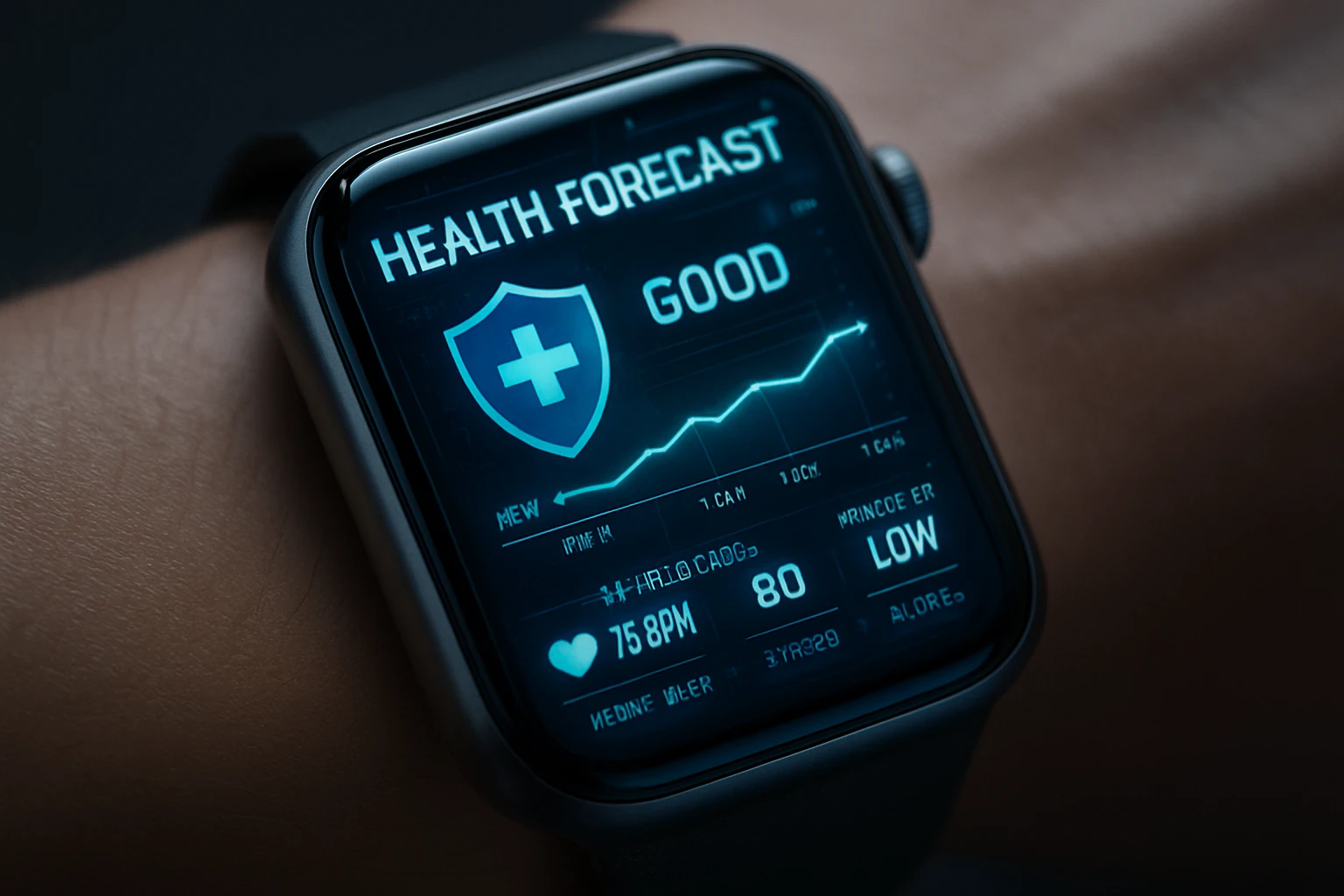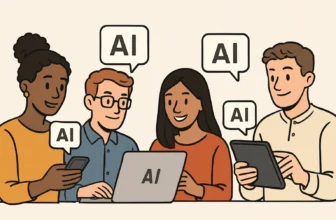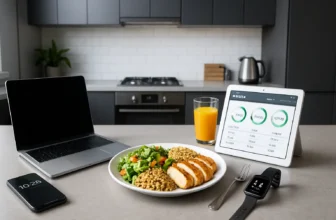
Could AI Know Your Health Before You Do?
What if I told you your smartwatch might know you’re getting sick before you even feel it? Yep—according to recent studies, AI can detect illness *days* before symptoms show up by simply analyzing changes in your heart rate, sleep patterns, or even how much you’re moving. Wild, right?
I don’t know about you, but I used to think of my watch as a glorified step counter. Sure, it buzzes when I sit too long or nudge me to chill out when I’m stressed. But I never thought it could become my own mini health detective, quietly working in the background, watching for signs I might miss entirely.
This is where AI health prediction comes in—science and tech holding hands to help us catch issues early, whether it’s an oncoming flu bug or something more serious like a heart irregularity. What used to be stuff you’d only expect in sci-fi flicks? It’s slowly turning into your next app download.
The Problem: We Don’t Notice Subtle Health Shifts (But AI Does)
Let’s be real—we’re not great at noticing the little red flags in our health. I mean, who hasn’t brushed off constant fatigue as “just a busy week”? Or told themselves that odd heart flutter wasn’t a big deal? I’ve done it too. Life gets busy, and we sort of ignore our bodies until they start yelling at us.
That’s where future health AI swoops in like a wellness superhero. It tracks those micro-patterns that we’d never notice. Think teeny changes in your resting heart rate, disrupted sleep cycles, or even how you’re typing on your phone. Seriously—some systems can detect early signs of cognitive decline just by how your thumbs dance across a keyboard. (Mind = blown.)
So… What Can You *Actually* Do With This Tech?
Okay, so AI is smart. Great. But how do *you* tap into that for your well-being today? Here’s how to start:
- Upgrade your wearable game: Devices like Fitbit, Apple Watch, and Oura Ring are baked with sensors that feed AI real-time data. Look for models that monitor heart rate variability, oxygen levels, or sleep quality.
- Use health apps with AI brains: Apps like WHOOP or Cardiogram go beyond data—they interpret it. They can spot anomalies and even ping you if something’s off.
- Share data with your doctor: Many apps let you export health files. That little graph from last week? Could help your doc catch something way earlier than usual.
Pro tip from my own life: I use a sleep-tracking app that flagged my increased heart rate during sleep for several nights. Thought it was just stress—but turns out I was coming down with something. I upped my hydration, took it easy, and sidestepped what could’ve been a nasty bug. Lifesaver.
The Bottom Line: Your Health Has a New Ally
Knowing what’s going on *inside* you—before your body decides to throw a full-on tantrum? Game-changer. AI health prediction isn’t some far-off fantasy. It’s already quietly revolutionizing how we manage our wellness. You don’t have to wait until you’re sick to focus on your health. With future health AI on your side, you can start being proactive, not reactive.
So go ahead—embrace the tech, listen to your body with new ears (or sensors?), and take your next step toward a healthier future. Ready to peek into your future self? Let’s dive in!
Could AI Know Your Health Before You Do?
What if I told you your smartwatch might know you’re getting sick before you even feel it? Yep—according to recent studies, AI can detect illness *days* before symptoms show up by simply analyzing changes in your heart rate, sleep patterns, or even how much you’re moving. Wild, right?
I don’t know about you, but I used to think of my watch as a glorified step counter. Sure, it buzzes when I sit too long or nudge me to chill out when I’m stressed. But I never thought it could become my own mini health detective, quietly working in the background, watching for signs I might miss entirely.
This is where AI health prediction comes in—science and tech holding hands to help us catch issues early, whether it’s an oncoming flu bug or something more serious like a heart irregularity. What used to be stuff you’d only expect in sci-fi flicks? It’s slowly turning into your next app download.
The Problem: We Don’t Notice Subtle Health Shifts (But AI Does)
Let’s be real—we’re not great at noticing the little red flags in our health. I mean, who hasn’t brushed off constant fatigue as “just a busy week”? Or told themselves that odd heart flutter wasn’t a big deal? I’ve done it too. Life gets busy, and we sort of ignore our bodies until they start yelling at us.
That’s where future health AI swoops in like a wellness superhero. It tracks those micro-patterns that we’d never notice. Think teeny changes in your resting heart rate, disrupted sleep cycles, or even how you’re typing on your phone. Seriously—some systems can detect early signs of cognitive decline just by how your thumbs dance across a keyboard. (Mind = blown.)
So… What Can You *Actually* Do With This Tech?
Okay, so AI is smart. Great. But how do *you* tap into that for your well-being today? Here’s how to start:
- Upgrade your wearable game: Devices like Fitbit, Apple Watch, and Oura Ring are baked with sensors that feed AI real-time data. Look for models that monitor heart rate variability, oxygen levels, or sleep quality.
- Use health apps with AI brains: Apps like WHOOP or Cardiogram go beyond data—they interpret it. They can spot anomalies and even ping you if something’s off.
- Share data with your doctor: Many apps let you export health files. That little graph from last week? Could help your doc catch something way earlier than usual.
Pro tip from my own life: I use a sleep-tracking app that flagged my increased heart rate during sleep for several nights. Thought it was just stress—but turns out I was coming down with something. I upped my hydration, took it easy, and sidestepped what could’ve been a nasty bug. Lifesaver.
The Bottom Line: Your Health Has a New Ally
Knowing what’s going on *inside* you—before your body decides to throw a full-on tantrum? Game-changer. AI health prediction isn’t some far-off fantasy. It’s already quietly revolutionizing how we manage our wellness. You don’t have to wait until you’re sick to focus on your health. With future health AI on your side, you can start being proactive, not reactive.
So go ahead—embrace the tech, listen to your body with new ears (or sensors?), and take your next step toward a healthier future. Ready to peek into your future self? Let’s dive in!
Could AI Know Your Health Before You Do?
What if I told you your smartwatch might know you’re getting sick before you even feel it? Yep—according to recent studies, AI can detect illness *days* before symptoms show up by simply analyzing changes in your heart rate, sleep patterns, or even how much you’re moving. Wild, right?
I don’t know about you, but I used to think of my watch as a glorified step counter. Sure, it buzzes when I sit too long or nudge me to chill out when I’m stressed. But I never thought it could become my own mini health detective, quietly working in the background, watching for signs I might miss entirely.
This is where AI health prediction comes in—science and tech holding hands to help us catch issues early, whether it’s an oncoming flu bug or something more serious like a heart irregularity. What used to be stuff you’d only expect in sci-fi flicks? It’s slowly turning into your next app download.
The Problem: We Don’t Notice Subtle Health Shifts (But AI Does)
Let’s be real—we’re not great at noticing the little red flags in our health. I mean, who hasn’t brushed off constant fatigue as “just a busy week”? Or told themselves that odd heart flutter wasn’t a big deal? I’ve done it too. Life gets busy, and we sort of ignore our bodies until they start yelling at us.
That’s where future health AI swoops in like a wellness superhero. It tracks those micro-patterns that we’d never notice. Think teeny changes in your resting heart rate, disrupted sleep cycles, or even how you’re typing on your phone. Seriously—some systems can detect early signs of cognitive decline just by how your thumbs dance across a keyboard. (Mind = blown.)
So… What Can You *Actually* Do With This Tech?
Okay, so AI is smart. Great. But how do *you* tap into that for your well-being today? Here’s how to start:
- Upgrade your wearable game: Devices like Fitbit, Apple Watch, and Oura Ring are baked with sensors that feed AI real-time data. Look for models that monitor heart rate variability, oxygen levels, or sleep quality.
- Use health apps with AI brains: Apps like WHOOP or Cardiogram go beyond data—they interpret it. They can spot anomalies and even ping you if something’s off.
- Share data with your doctor: Many apps let you export health files. That little graph from last week? Could help your doc catch something way earlier than usual.
Pro tip from my own life: I use a sleep-tracking app that flagged my increased heart rate during sleep for several nights. Thought it was just stress—but turns out I was coming down with something. I upped my hydration, took it easy, and sidestepped what could’ve been a nasty bug. Lifesaver.
The Bottom Line: Your Health Has a New Ally
Knowing what’s going on *inside* you—before your body decides to throw a full-on tantrum? Game-changer. AI health prediction isn’t some far-off fantasy. It’s already quietly revolutionizing how we manage our wellness. You don’t have to wait until you’re sick to focus on your health. With future health AI on your side, you can start being proactive, not reactive.
So go ahead—embrace the tech, listen to your body with new ears (or sensors?), and take your next step toward a healthier future. Ready to peek into your future self? Let’s dive in!
Could AI Know Your Health Before You Do?
What if I told you your smartwatch might know you’re getting sick before you even feel it? Yep—according to recent studies, AI can detect illness *days* before symptoms show up by simply analyzing changes in your heart rate, sleep patterns, or even how much you’re moving. Wild, right?
I don’t know about you, but I used to think of my watch as a glorified step counter. Sure, it buzzes when I sit too long or nudge me to chill out when I’m stressed. But I never thought it could become my own mini health detective, quietly working in the background, watching for signs I might miss entirely.
This is where AI health prediction comes in—science and tech holding hands to help us catch issues early, whether it’s an oncoming flu bug or something more serious like a heart irregularity. What used to be stuff you’d only expect in sci-fi flicks? It’s slowly turning into your next app download.
The Problem: We Don’t Notice Subtle Health Shifts (But AI Does)
Let’s be real—we’re not great at noticing the little red flags in our health. I mean, who hasn’t brushed off constant fatigue as “just a busy week”? Or told themselves that odd heart flutter wasn’t a big deal? I’ve done it too. Life gets busy, and we sort of ignore our bodies until they start yelling at us.
That’s where future health AI swoops in like a wellness superhero. It tracks those micro-patterns that we’d never notice. Think teeny changes in your resting heart rate, disrupted sleep cycles, or even how you’re typing on your phone. Seriously—some systems can detect early signs of cognitive decline just by how your thumbs dance across a keyboard. (Mind = blown.)
So… What Can You *Actually* Do With This Tech?
Okay, so AI is smart. Great. But how do *you* tap into that for your well-being today? Here’s how to start:
- Upgrade your wearable game: Devices like Fitbit, Apple Watch, and Oura Ring are baked with sensors that feed AI real-time data. Look for models that monitor heart rate variability, oxygen levels, or sleep quality.
- Use health apps with AI brains: Apps like WHOOP or Cardiogram go beyond data—they interpret it. They can spot anomalies and even ping you if something’s off.
- Share data with your doctor: Many apps let you export health files. That little graph from last week? Could help your doc catch something way earlier than usual.
Pro tip from my own life: I use a sleep-tracking app that flagged my increased heart rate during sleep for several nights. Thought it was just stress—but turns out I was coming down with something. I upped my hydration, took it easy, and sidestepped what could’ve been a nasty bug. Lifesaver.
The Bottom Line: Your Health Has a New Ally
Knowing what’s going on *inside* you—before your body decides to throw a full-on tantrum? Game-changer. AI health prediction isn’t some far-off fantasy. It’s already quietly revolutionizing how we manage our wellness. You don’t have to wait until you’re sick to focus on your health. With future health AI on your side, you can start being proactive, not reactive.
So go ahead—embrace the tech, listen to your body with new ears (or sensors?), and take your next step toward a healthier future. Ready to peek into your future self? Let’s dive in!
Could AI Know Your Health Before You Do?
What if I told you your smartwatch might know you’re getting sick before you even feel it? Yep—according to recent studies, AI can detect illness *days* before symptoms show up by simply analyzing changes in your heart rate, sleep patterns, or even how much you’re moving. Wild, right?
I don’t know about you, but I used to think of my watch as a glorified step counter. Sure, it buzzes when I sit too long or nudge me to chill out when I’m stressed. But I never thought it could become my own mini health detective, quietly working in the background, watching for signs I might miss entirely.
This is where AI health prediction comes in—science and tech holding hands to help us catch issues early, whether it’s an oncoming flu bug or something more serious like a heart irregularity. What used to be stuff you’d only expect in sci-fi flicks? It’s slowly turning into your next app download.
The Problem: We Don’t Notice Subtle Health Shifts (But AI Does)
Let’s be real—we’re not great at noticing the little red flags in our health. I mean, who hasn’t brushed off constant fatigue as “just a busy week”? Or told themselves that odd heart flutter wasn’t a big deal? I’ve done it too. Life gets busy, and we sort of ignore our bodies until they start yelling at us.
That’s where future health AI swoops in like a wellness superhero. It tracks those micro-patterns that we’d never notice. Think teeny changes in your resting heart rate, disrupted sleep cycles, or even how you’re typing on your phone. Seriously—some systems can detect early signs of cognitive decline just by how your thumbs dance across a keyboard. (Mind = blown.)
So… What Can You *Actually* Do With This Tech?
Okay, so AI is smart. Great. But how do *you* tap into that for your well-being today? Here’s how to start:
- Upgrade your wearable game: Devices like Fitbit, Apple Watch, and Oura Ring are baked with sensors that feed AI real-time data. Look for models that monitor heart rate variability, oxygen levels, or sleep quality.
- Use health apps with AI brains: Apps like WHOOP or Cardiogram go beyond data—they interpret it. They can spot anomalies and even ping you if something’s off.
- Share data with your doctor: Many apps let you export health files. That little graph from last week? Could help your doc catch something way earlier than usual.
Pro tip from my own life: I use a sleep-tracking app that flagged my increased heart rate during sleep for several nights. Thought it was just stress—but turns out I was coming down with something. I upped my hydration, took it easy, and sidestepped what could’ve been a nasty bug. Lifesaver.
The Bottom Line: Your Health Has a New Ally
Knowing what’s going on *inside* you—before your body decides to throw a full-on tantrum? Game-changer. AI health prediction isn’t some far-off fantasy. It’s already quietly revolutionizing how we manage our wellness. You don’t have to wait until you’re sick to focus on your health. With future health AI on your side, you can start being proactive, not reactive.
So go ahead—embrace the tech, listen to your body with new ears (or sensors?), and take your next step toward a healthier future. Ready to peek into your future self? Let’s dive in!
Could AI Know Your Health Before You Do?
What if I told you your smartwatch might know you’re getting sick before you even feel it? Yep—according to recent studies, AI can detect illness *days* before symptoms show up by simply analyzing changes in your heart rate, sleep patterns, or even how much you’re moving. Wild, right?
I don’t know about you, but I used to think of my watch as a glorified step counter. Sure, it buzzes when I sit too long or nudge me to chill out when I’m stressed. But I never thought it could become my own mini health detective, quietly working in the background, watching for signs I might miss entirely.
This is where AI health prediction comes in—science and tech holding hands to help us catch issues early, whether it’s an oncoming flu bug or something more serious like a heart irregularity. What used to be stuff you’d only expect in sci-fi flicks? It’s slowly turning into your next app download.
The Problem: We Don’t Notice Subtle Health Shifts (But AI Does)
Let’s be real—we’re not great at noticing the little red flags in our health. I mean, who hasn’t brushed off constant fatigue as “just a busy week”? Or told themselves that odd heart flutter wasn’t a big deal? I’ve done it too. Life gets busy, and we sort of ignore our bodies until they start yelling at us.
That’s where future health AI swoops in like a wellness superhero. It tracks those micro-patterns that we’d never notice. Think teeny changes in your resting heart rate, disrupted sleep cycles, or even how you’re typing on your phone. Seriously—some systems can detect early signs of cognitive decline just by how your thumbs dance across a keyboard. (Mind = blown.)
So… What Can You *Actually* Do With This Tech?
Okay, so AI is smart. Great. But how do *you* tap into that for your well-being today? Here’s how to start:
- Upgrade your wearable game: Devices like Fitbit, Apple Watch, and Oura Ring are baked with sensors that feed AI real-time data. Look for models that monitor heart rate variability, oxygen levels, or sleep quality.
- Use health apps with AI brains: Apps like WHOOP or Cardiogram go beyond data—they interpret it. They can spot anomalies and even ping you if something’s off.
- Share data with your doctor: Many apps let you export health files. That little graph from last week? Could help your doc catch something way earlier than usual.
Pro tip from my own life: I use a sleep-tracking app that flagged my increased heart rate during sleep for several nights. Thought it was just stress—but turns out I was coming down with something. I upped my hydration, took it easy, and sidestepped what could’ve been a nasty bug. Lifesaver.
The Bottom Line: Your Health Has a New Ally
Knowing what’s going on *inside* you—before your body decides to throw a full-on tantrum? Game-changer. AI health prediction isn’t some far-off fantasy. It’s already quietly revolutionizing how we manage our wellness. You don’t have to wait until you’re sick to focus on your health. With future health AI on your side, you can start being proactive, not reactive.
So go ahead—embrace the tech, listen to your body with new ears (or sensors?), and take your next step toward a healthier future. Ready to peek into your future self? Let’s dive in!












